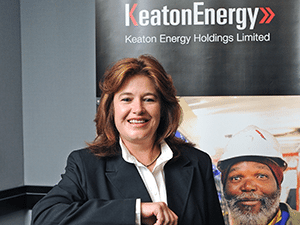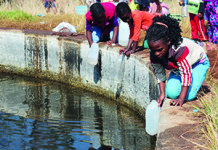
[miningmx.com] – FOR ALL THE interest in the Waterberg coalfields, there’s no doubting that Witbank in Mpumalanga province is where the greater of the economic activity will remain in the short-term.
And there are a number of newly established coal producers, especially juniors, that are making hay in the region. What they lack in large balance sheets, they claw back in ingenuity and an ability to pick the eyes out of the remaining riches of the coalfields.
Keaton Energy CEO, Mandi Glad, said the company hoped to “break first ground’ on its $22.7m to $28.4m Moabsvelden mine in the first or second quarter of 2015, a development that would take total saleable production by the Johannesburg-listed junior to 4.2 million tonnes a year (mtpa).
“We will develop Moabsvelden as a remote pit,’ said Glad of the prospect which was bought from Xceed Resources, an Australian-listed firm on February 19. “We will build a two-stage washplant and upgrade the existing Eskom plant.
Moabsvelden is adjacent to Keaton Energy’s existing Vanggatfontein mine in South Africa’s Mpumalanga province. Keaton Energy spent $66m developing Vanggatfontein which Keaton said earlier this year would produce 2.19mt for the 2013/14 financial year. This represented a 45% production increase year-on-year as well as steady-state for the operation.
“This long life colliery now forms the backbone of the soon to be enlarged Vanggatfontein-Moabsvelden operation which will form the core of the growing Keaton group of companies,’ said Glad.
The market response to the higher production was muted however with shares in Keaton barely nudging – an outcome that Glad admits is a frustration. Yet dealmaking such as the Xceed deal represents the future for Keaton with Glad convinced junior mining firms like hers will benefit from consolidation in the region.
This was not to ignore larger types of transactions such as the possibility Keaton Energy could become involved in the bidding for coal assets due to be sold by Total. The French group said in February it was seeking to divest from its coal production business in South Africa.
“We will have a look at Total South Africa, perhaps with support of Gunvor, or as part of consortium,’ said Glad referring to Keaton Energy’s strategic partnership with the Geneva-based commodities trading group.
“We will always throw our hats into the ring, but I believe Keaton growth will be from consolidation,’ she said. Gunvor owns just under 35% of Keaton Energy.
Owing to the investment in Moabsvelden, Glad believed plans to start paying a dividend to shareholders would be delayed about a year. “I thought we might pay dividends in March 2015. Maybe it will be the year after. We need to give shareholders a return as the share price is not doing that at the moment,’ she said.
Glad also said the company remained committed to investments in anthracite. The company owns the Vaalkrantz colliery in South Africa’s KwaZulu-Natal province. The colliery has been an unpredictable performer, however.
“At current prices, Vaalkrantz is a struggle, but it will print money if anthracite goes to $100/t plus. We keep it for our exposure to the Brazilian anthracite buying market and because there’s some 700 to 800 people we employ there.
“If Vaalkrantz can just wash its face over the coming years that would be good,’ she said.
UNIVERSAL COAL
Australian-listed Universal Coal believed there’s still plenty of scope in the Witbank coalfield. “We are in the Witbank region which is a very well-established mining area,’ said Tony Weber, CEO of Universal Coal,’ in an interview at the firm’s Pretoria premises.
“It may now be a twilight area, but there’s a huge amount of potential for smaller players like us. There will be a few submarines that major coal mining companies will let go, and which the juniors will turn into ships,’ Weber said.
Already, there are signs that large coal mining companies are looking differently at South Africa either by dint of regulatory headwinds that make business difficult, or because certain assets are ageing.
BHP Energy Coal South Africa (Becsa) has long been rumoured to be considering divesting from South Africa, while Total SA announced in February it wanted to sell its local coal business (but not exit from the rest of its business in the country).
Last year, Exxaro Resources said it would sell its mothballed 700ktpa (saleable) New Clydesdale Colliery (NCC) in Mpumalanga province as it believed a junior mining company might be able to run it more efficiently.
Enter Universal Coal which bought the asset earlier this year and now intends using its infrastructure – and resources – to add to the feasibility of its adjacent project, Roodekop.
Weber won’t disclose the capital savings in using existing infrastructure that is now available to Roodekop through NCC, but he said the combined resource will provide some 500ktpa to 700ktpa of saleable coal for 20-years of operating life of which about 15 years will be predominantly an export product.
“Eskom will be a sidestream of the NCC/Roodekop business with most of the product going into the export market. We have already some 50ktpa in export entitlement through South Africa’s Quattro system, but it’s pretty easy to get additional entitlement,’ said Weber.
One of the few outstanding issues ahead of building NCC/Roodekop is acquiring the relevant licences from the South African government. Normally, this is a fairly strung-out process with some coal developers complaining it takes about three years to win regulatory approval.
“Getting the water use licence for Roodekop is a fairly long process, but we are very close,’ said Weber. “We’ve got everything else in place. We do need it before June,’ he added.
Finance for NCC/Roodekop is the other elephant in the room. Weber acknowledged that raising capital for coal developments in South Africa has been a tough process in the past.
“It’s difficult to market in the offshore markets owing to the South African country risk,’ said Weber. He also alluded – without naming specific companies – to past corporate failures that have muddied the waters for coal development firms operating in South Africa.
Coal of Africa (CoAL) and Continental Coal are two Australian-lised coal development and operating firms that have struggled to meet production targets and have had to be refinanced lately.
“Investors are saying go and deliver first,’ said Weber of raising finance for South African coal mining. “It’s not an easy market to be in so we just have to hit deadlines,’ he said.











